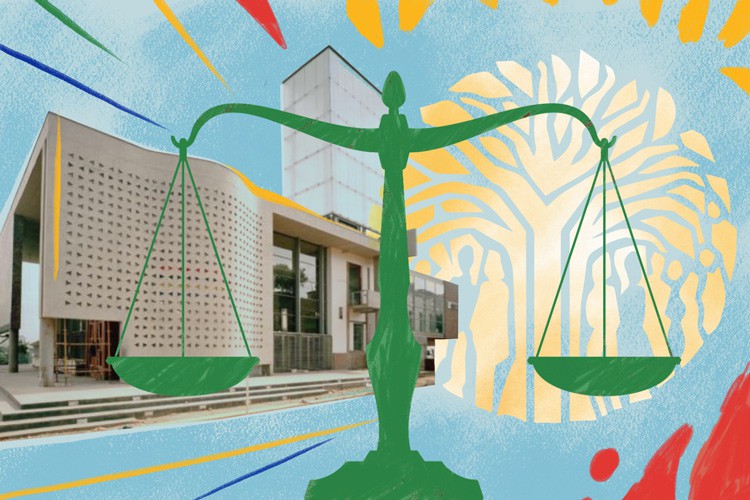
18 November 2025
The Western Cape High Court has overturned an eviction order against 78-year-old Noor-Banu Allie, a District Six pensioner. Illustration: Lisa Nelson
A 78-year-old District Six pensioner, a survivor of the forced removals from District Six during apartheid, has won her appeal against an eviction order.
The eviction application, brought by her landlord, sought to remove Allie from the home she has rented since 2006. It would have forced her out of the neighbourhood she has lived in for most of her life. Her monthly rental is about R2,200 a month. With her monthly pension and social grant income of R6,721, she would not be able to afford other accommodation in the area.
Judge Vincent Saldanha of the Western Cape High Court opened his judgment by citing the history of District Six: “Having withstood the dispossession and displacement of over 60,000 Black people from District Six through the Group Areas Act of 1957, Ms Allie has, despite the demolition of the home in which she lived, by the bulldozers of apartheid’s henchmen, through sheer perseverance, remained in District Six.”
Allie has lived in District Six since she was a child and has rented a semi-detached house in the area since 2006. Her family home and butcher shop on Hanover Street were demolished in the 1970s.
She later attempted to lodge a land restitution claim, but was unsuccessful.
She resubmitted it in 2015, but the Constitutional Court’s Land Access Movement of South Africa ruling halted the processing of new claims, leaving her stuck in a stalled system for a second time.
The eviction application was brought by managing agent Waleed Ras on behalf of Westminster Property Developments, which bought the house in mid-2023.
In his affidavit, Ras claimed Allie’s lease had ended and that the property was “unsafe” and required significant renovations that could not be completed while she lived there.
The landlord issued two notices to vacate in 2023 and then approached the Cape Town Magistrates’ Court under the Prevention of Illegal Eviction from and Unlawful Occupation of Land Act (PIE). The magistrate accepted the landlord’s case and granted the eviction.
But on appeal, the High Court found there was “simply no legal basis” for the lease cancellation. Allie provided extensive documentation showing she had held continuous, formal leases since 2006, had consistently paid rent, and had repeatedly asked the landlord to carry out maintenance.
She also supplied photographs showing the home was habitable.
The court found no evidence that the house was derelict or unsafe, and noted that the landlord had refused her offer to move into the vacant neighbouring unit while repairs were done.
The judge described the renovation justification as a “ruse” and said the landlord had changed its legal basis “opportunistically”. Initially, the landlord relied on the need for renovations. Later, they attempted to use Section 5(5) of the Rental Housing Act, which regulates month-to-month leases. Judge Saldanha found this shift “disingenuous”.
The judge also pointed to Allie’s financial situation. She receives “a total of R6,721 per month” from her Government Employees Pension Fund benefit and SASSA Older Persons Grant. Her monthly expenditure is approximately R4,900, including “rental of R2,200, transport costs of approximately R100 per month … and a monthly cost of water, electricity and her telephone accounts.” Provision for food was “no more than R2,000 per month”. The court found she would not be able to secure alternative accommodation anywhere in Cape Town on this income.
The City of Cape Town and the provincial Department of Social Development (DSD) were both asked to report on possible alternative accommodation. The City had no emergency housing available and advised her to apply to different social-housing providers. With help from her lawyers, she contacted each one. All rejected her due to age limits, income thresholds, lack of available units, or exclusion of pensioners. The judge described the City’s report as “most unhelpful” and said it had effectively sent her “on a wild goose chase”.
DSD social workers found she was not frail, did not qualify for frail-care accommodation, and had no family in Cape Town who could take her in. They recorded her request to remain in the community she has known for decades.
The High Court concluded that evicting Allie would not be just or equitable. She cannot afford private rental housing, she has long-standing ties to the area, and the unresolved restitution process has removed any viable alternative.
The judge said, “The irony is not lost that the entrance to the well-established District Six Museum … lies directly across the very Magistrates’ Court that has relegated the 78-year-old Ms Allie to homelessness.”
Concluding his judgment, Judge Saldanha wrote: “Ms Allie was not simply seeking to exercise a personal preference or a wish to choose where she may live. The history and desperation of all people who were unlawfully and maliciously dispossessed of their homes under apartheid from District Six speaks for itself. To ignore her voice in the context of the circumstances of this particular matter was nothing more than to disregard the longstanding fight for justice in its true sense for the people of District Six”.
The eviction application was dismissed with costs.